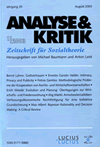Suchergebnisse
"Philip Pettit"
Titel: Trust, Reliance and the Internet
Autor: Philip Pettit
Seite: 108-121
Abstract: rusting someone in an intuitive, rich sense of the term involves not just relying on that person, but manifesting reliance on them in the expectation that this manifestation of reliance will increase their reason and motive to prove reliable. Can trust between people be formed on the basis of Internet contact alone? Forming the required expectation in regard to another person, and so trusting them on some matter, may be due to believing that they are trustworthy; to believing that they seek esteem and will be rationally responsive to the good opinion communicated or promised by an act of trust; or to both factors at once. Neither mechanism can rationally command confidence, however, in the case where people are related only via the Internet. On the Internet everyone wears the ring of Gyges; everyone is invisible, in their personal identity, to others.
Titel: Esteem, Identifiability and the Internet
Autor: Geoffrey Brennan / Philip Pettit
Seite: 139-157
Abstract: The desire for esteem, and the associated desire for good reputation, serve an important role in ordinary social life in disciplining interactions and supporting the operation of social norms. The fact that many Internet relations are conducted under separate dedicated e-identities may encourage the view that Internet relations are not susceptible to these esteem-related incentives. We argue that this view is mistaken. Certainly, pseudonyms allow individuals to moderate the effects of disesteem---either by changing the pseudonym to avoid the negative reputation, or by partitioning various audiences according to different audience values. However, there is every reason to believe that a good e-reputation is an object of desire for real agents. Further, although integrating one's reputation under a single identity has some esteem-enhancing features, those features are not necessarily decisive. We explore in the paper what some of the countervailing considerations might be, by appeal to various analogies with the Internet case.

Trust and Community on the Internet. Opportunities and Restrictions for Online Cooperation
2004 (26) Heft 1
Guest-Editors: Bernd Lahno / Uwe Matzat
Editorial
Early studies in the area of Internet Research emphasized the deficiencies that computer-mediated communication as opposed to face-to-face communication would have. The chances for the evolution of cooperative relationships on the Internet were assessed sceptically. Present research findings correct this point of view. In spite of a missing central authority, without formal controls and sanctions, with anonymity and easy-to-use exit options there is not only chaos and anomy on the Internet. Rath...